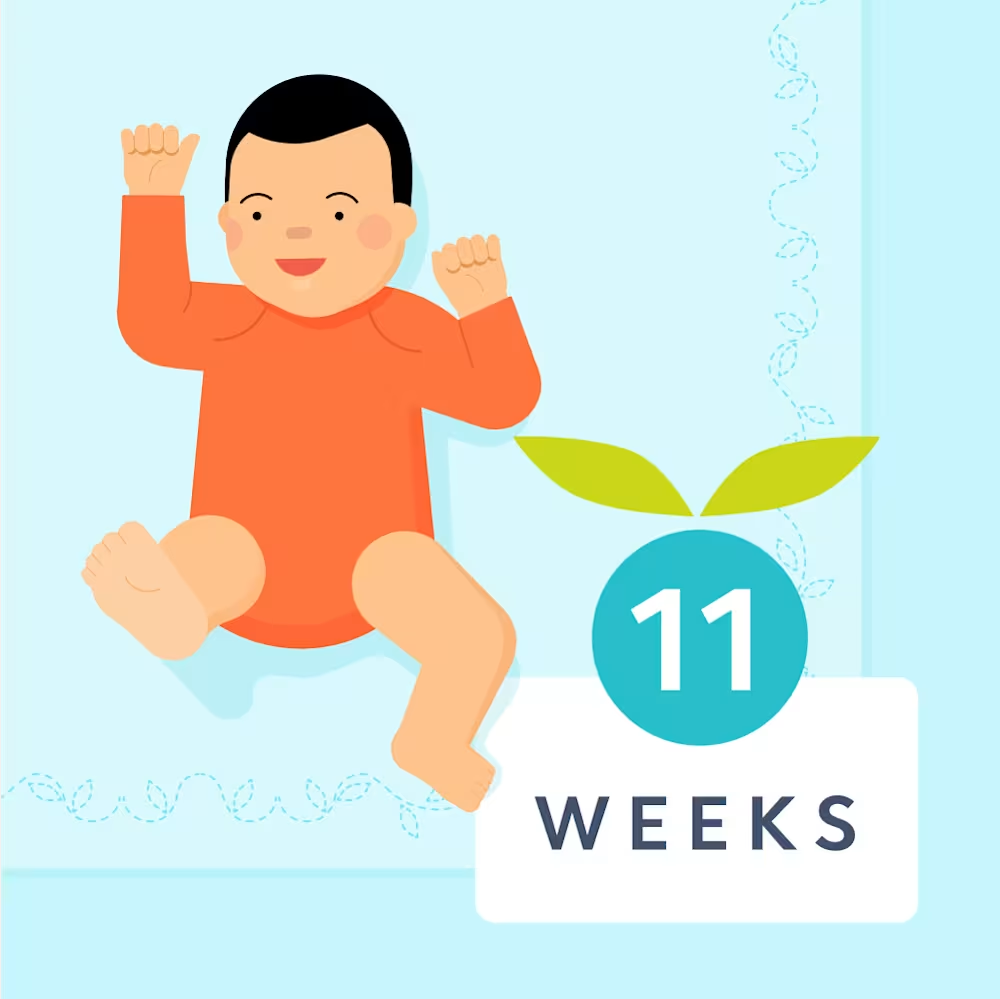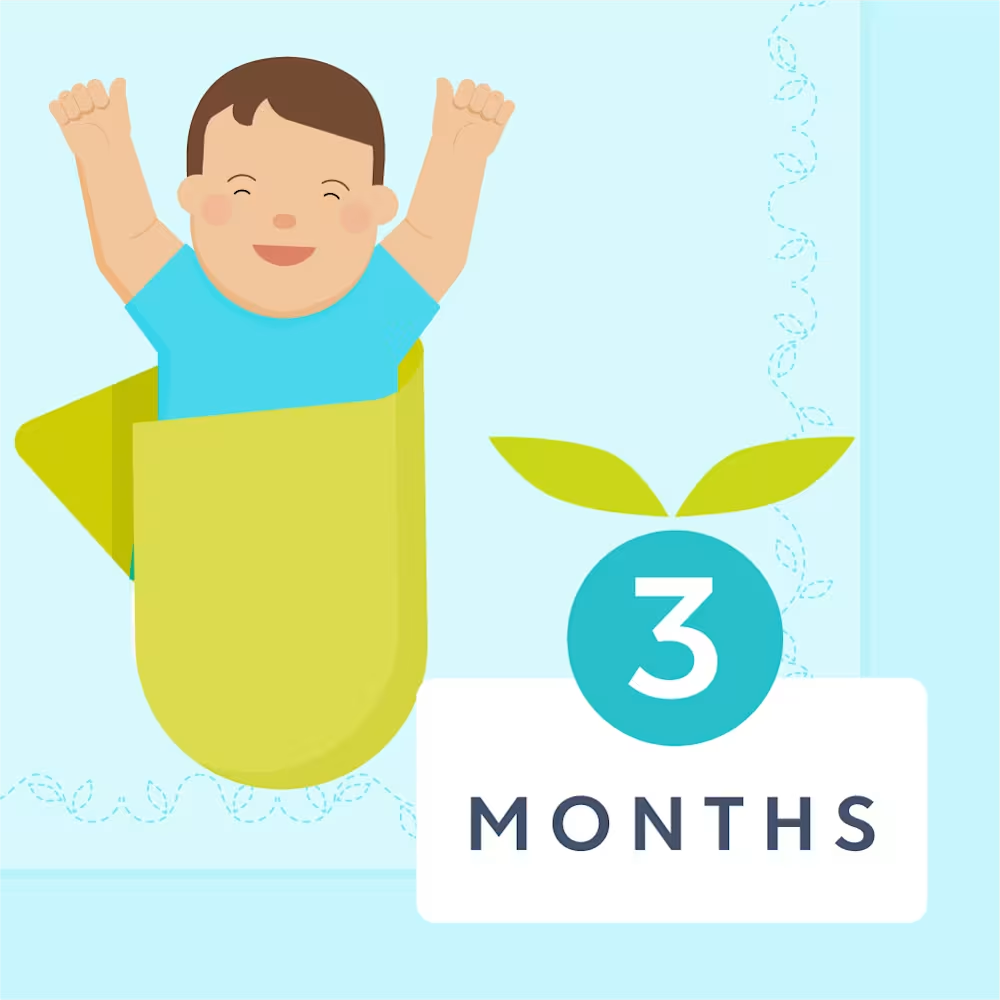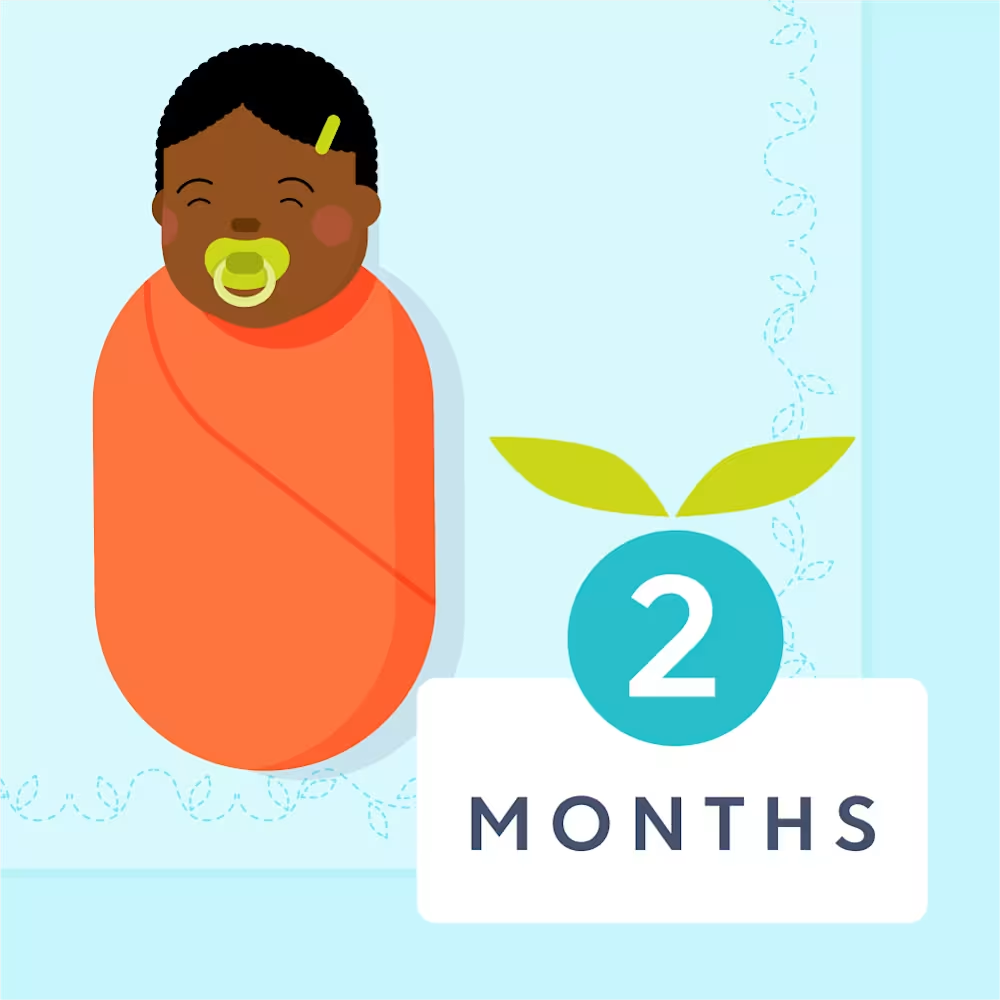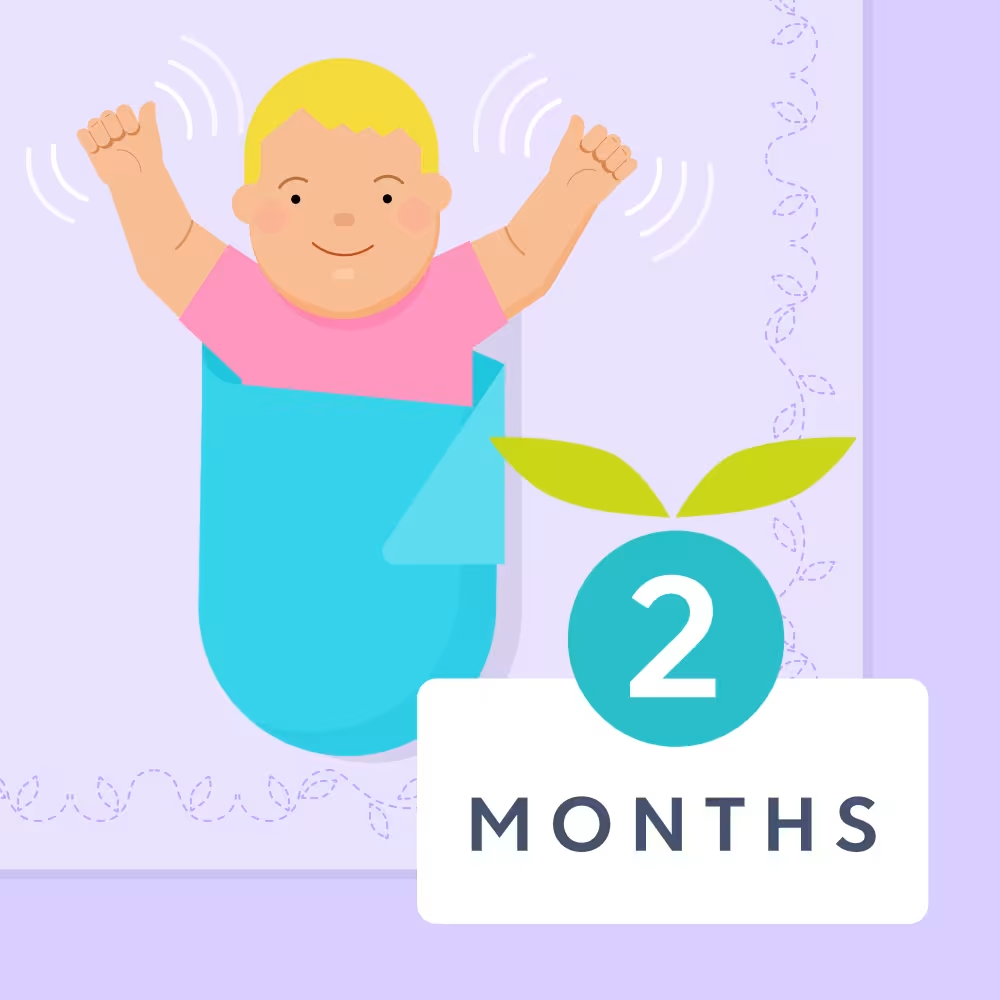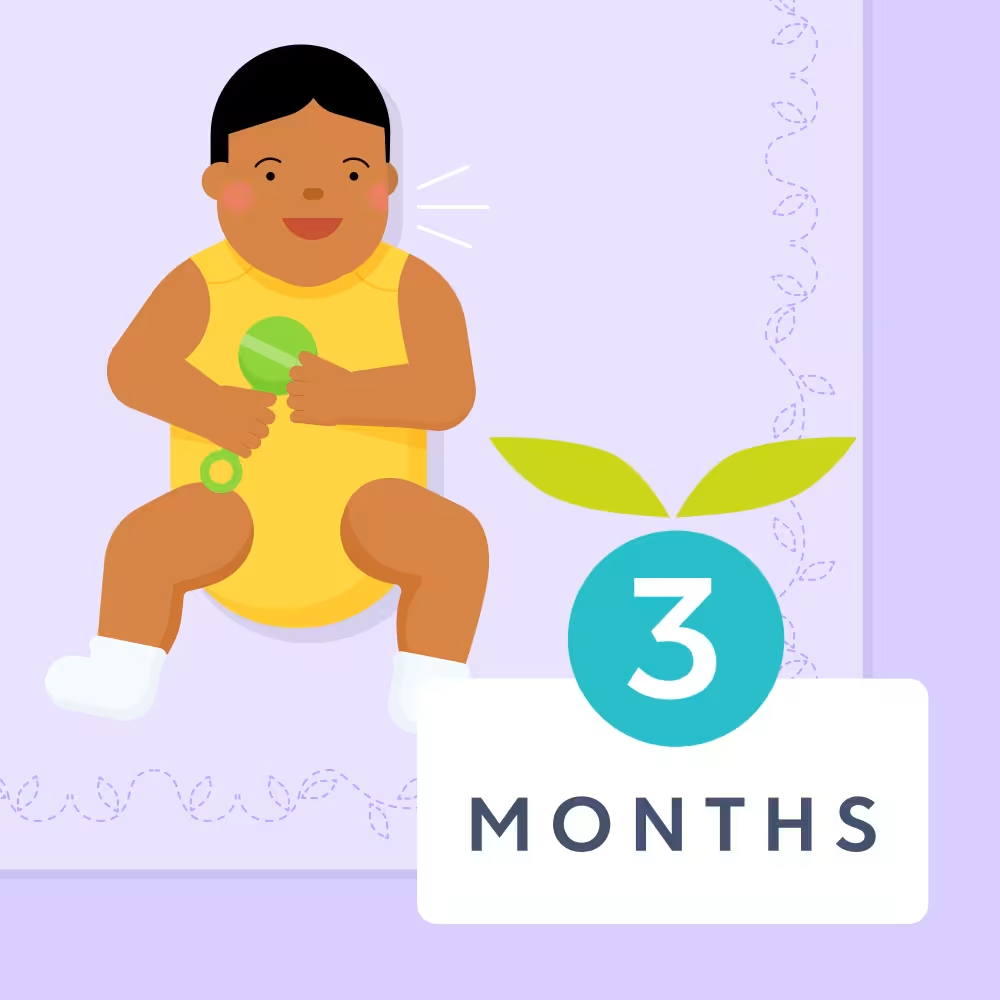10 week old sleep schedule: Bedtime and nap schedule
Updated Dec 17, 2025
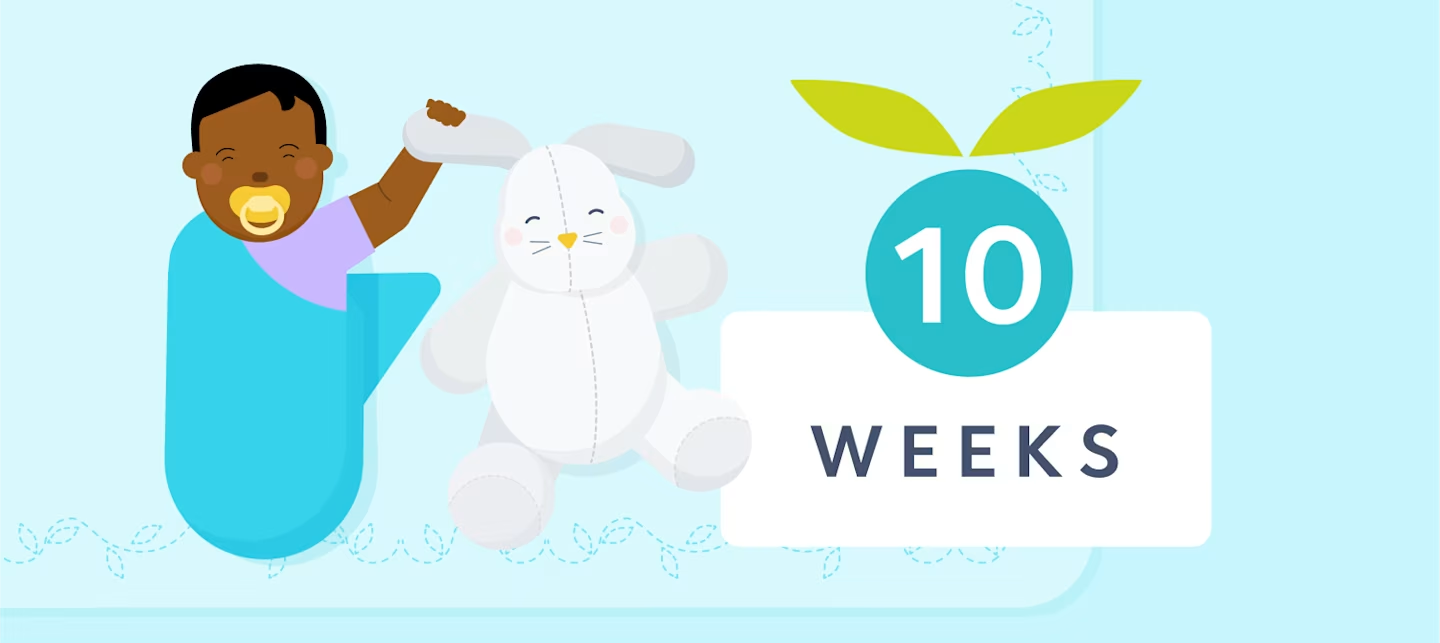
At 10 weeks, your baby is already 2.5 months old! Sometimes it may feel like the weeks are flying by, while at other times the days (and sleepless nights) may feel like they’ll never end. At this age, we expect little ones to continue to have unpredictable sleep patterns, as their circadian rhythm has yet to mature. However, around , babies tend to have more regular 24-hour cycles of sleep and eating — you’re getting there!
In this article, we’ll give you guidance on 10 week old sleep schedules, offer tips for setting a good sleep foundation, and provide tools to help determine when your child may need to snooze again.
How much should a 10 week old sleep?
At 10 weeks we recommend aiming for around 15.5 hours of total sleep [] over a 24-hour period for your little one. This typically breaks down to around 5 - 6 hours of daytime sleep split over 4 - 5 naps per day. The total number of naps will be influenced by their morning rise time and nap lengths that day. For example, on a day when your newborn wakes at 6:00 AM and consistently takes 30 - 40 minute naps during the day, they’ll likely need that additional nap (or two!) to comfortably make it to “bedtime.”
Keep in mind that the total number of hours your baby sleeps will likely vary day to day at this age — this is normal. And we don’t expect all babies to need the same amount of sleep either. Some children have higher and lower sleep needs. Instead of simply focusing on the number of hours of sleep per day, we suggest paying attention to your child’s overall demeanor — including their mood and energy levels — when determining if they’re well-rested.
Here's a quick overview of what you may expect when it comes to 10 week olds and sleep. Note that these figures are averages and should be used as guidelines.
Sample schedule for 10 weeks
At 10 weeks, your little one's "schedule" will likely still be unpredictable. Sleep times and durations will vary and this is normal! Here's what a day in the life of a 10 week old newborn may look like:

Top sleep tips for 10 week olds
Try to limit overtiredness. While it may be tempting to try to keep your 10 week old awake for longer stretches during the day in hopes of lengthening their stretches of night sleep, we recommend avoiding this approach. If your child stays awake too long it can lead to , which makes it harder for babies to fall asleep and stay asleep. Instead, trying your best to ensure your child is well-rested throughout the day can lead to more sufficient sleep around the clock. Plus, if you haven’t already, you may soon see some longer stretches of night sleep since day/night confusion has likely resolved at this point.
Consider capping naps at 2 hours. Nap lengths will continue to be unpredictable at 10 weeks. Your little one may sleep for 30 minutes one nap and then snooze for 2 hours later that day. You never really know! However, if your child is regularly napping for 2+ hours and you suspect it’s impacting their overnight sleep, consider capping to help consolidate night sleep and regulate their schedule. At 10 weeks, we expect about 5 - 6 hours of daytime sleep per day.
If your baby shows signs of rolling, it’s time to stop swaddling. According to recommendations from the American Academy of Pediatrics [], it’s best to stop swaddling your baby as soon as they show any signs of rolling. Most babies will transition out of the swaddle at around 2 - 3 months. We recommend using a (wearable blanket) in place of a swaddle as they can help keep your baby warm, comfortable, and safe for sleep. Putting on a sleep sack can be included in your child’s for years to come!
Naptime schedule for 10 weeks
How long should a 10 week old nap?
Babies this age aren’t ready for a structured sleep schedule quite yet, however, we can expect that little ones may sleep for about 5 - 6 hours during the day at this age. Daytime sleep will usually be broken up into 4 - 5 naps. It’s not uncommon for nap lengths to vary throughout the day — and every day will probably look different! We won’t expect more consistent sleep patterns until around, when children typically have more regular 24-hour cycles of sleeping and eating.
In the meantime, paying attention to and can help you determine when your child may be ready to nap again. At 2.5 months, babies can usually comfortably stay awake for 45 minutes - 1.75 hours. If you notice your baby is exhibiting sleepy cues — like rubbing their eyes, staring off into space, or becoming fussy — and they’ve been awake for 45+ minutes, this is usually a sign that they’re ready for some shuteye.
Keep in mind sleepy cues can be fleeting and easy to miss. If you haven’t noticed any sleep cues, we recommend offering rest after around 1.5 hours of awake time to avoid overtiredness.
How many naps for a 10 week old?
Typically, 10 week olds take around 4 - 5 naps per day. However, the number of naps will depend on your child’s morning wake time and length of naps that day, as well as how long they can comfortably stay awake between sleep periods. A typical wake window at 10 weeks is around 45 minutes - 1.75 hours. Awake periods tend to be the shortest in the morning and lengthen as the day progresses.
Bedtime for 10 week olds
What time should a 10 week old go to bed?
Babies at 10 weeks aren’t usually ready for a predictable, early bedtime yet. Sleep is still pretty variable in the newborn phase. “Bedtime” won’t be dictated by the clock — instead it will depend on the time they woke up in the morning [] and the number of naps they took that day. Your little one’s longest stretch of sleep in a 24-hour period may come pretty late (after 10:00 PM!) at this age. Children may be ready for a more regular early bedtime at around 3 - 4 months, once their internal clock has developed more.
Why does my 10 week old keep waking up at night crying?
At 10 weeks, your baby may start giving you slightly longer stretches of nighttime sleep — a small but welcome milestone! Even so, frequent night waking is still normal and expected at this age. Most babies continue to wake for feedings and comfort, and sleep patterns can vary widely from one day to the next. Just like everything else in these early months, every day (and night!) will likely be different.
Is there a sleep regression at 10 weeks old?
Newborn sleep is unpredictable, so frequent night wakings and short naps are normal at this age, so this phase of erratic sleep isn’t considered a “regression.” By 10 weeks, is often resolved, which may allow some babies to sleep for longer stretches overnight. However, it's important to remember that each baby is different and if your little one isn't quite there yet, that's OK too.
Can my 10 week old sleep with a pacifier?
Pacifiers can be introduced to your baby at 10 weeks, though not all babies may take to them. The AAP encourages pacifier use during sleep times, as it can provide comfort and may reduce the risk of sudden infant death syndrome (SIDS) []. They are also often recommended for preterm or low-birth-weight babies to aid in developing their sucking reflex [].
However, the AAP advises against using a pacifier to replace or delay essential feedings of breast milk or formula, which are crucial for your baby's growth and brain development.
Should I swaddle my 10 week old?
You can continue swaddling your baby at 10 weeks if they haven’t started showing signs of rolling over, which may happen around this time []. If your baby doesn't like traditional swaddles or is rolling (or attempting), there are safe . Transitional swaddles and sleep sacks provide a snug, secure feeling without restricting arm movement, making them an excellent choice as your baby grows.
Can I sleep train a 10 week old?
Sleep training at 10 weeks. It’s normal for little ones at this age to need help from a parent to fall asleep. They often rely on rocking, feeding, or cuddling to settle. If you're looking for ways to help your baby in the newborn phase, consider implementing some for healthy sleep hygiene.
Can a 10 week old sleep on their stomach or side?
The AAP recommends always placing your baby on their back for sleep — not on their stomach or side []. This position helps reduce the risk of SIDS. Once your baby is able to roll both ways (from back to front and front to back), you don't need to reposition them if they roll on their own while sleeping.
What are the developmental milestones for a 10 week old?
At 10 weeks, your little one may be making cooing noises and even smiling! However, keep in mind there’s a wide range of what's considered typical, and not all babies hit these milestones at the same time. Most little ones will try these skills by around 12 weeks, but not all. If you have questions or concerns about your baby’s development, don’t hesitate to reach out to their healthcare provider.
Holds head up briefly when on tummy
Begins to push up on hands during tummy time
Moves arms and legs more smoothly
Makes cooing noises
Briefly opens or relaxes hands
Cries to communicate most needs
Smiles at your face and seems happy to see you
Looks toward loud noises
May put hand to mouth
Does a 10 week old need to eat during the night?
It’s still normal and developmentally appropriate for babies at 10 weeks to wake up hungry during the night. Many babies also go through a around 3 months, which can lead to more frequent nighttime feedings. We recommend continuing to feed on demand and consulting with your pediatrician if you have any concerns about your baby’s overnight feeding needs.
Takeaway
Most babies at 10 weeks will take 4 - 5 naps per day, with 45 minutes to 1.75 hours of awake time between sleep periods.
Babies this age aren’t ready for a structured sleep schedule quite yet, however, we can expect that little ones may sleep for about 5 - 6 hours during the day at this age.
Paying attention to and can help you determine when your child may be ready to nap again.
Expect babies to wake during the night for feedings and comfort. Consult with healthcare professionals for guidance on night feedings.
If you're curious about what lies ahead in the next month, glimpse into the future to see what you might experience once your baby is an . Take a look back at how far your baby has come by revisiting what they may have been like as a .
Share article:
Note: The content on this site is for informational purposes only and should not replace medical advice from your doctor, pediatrician, or medical professional. If you have questions or concerns, you should contact a medical professional.
6 Sources
Share article:
